Over 30 years of anarchist writing from Ireland listed under hundreds of topics
Opinion
Teachers vote for action but leaders opt for talks
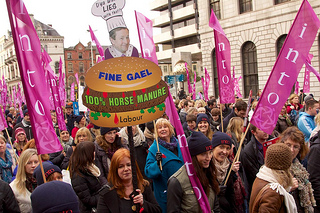 Members of the Irish National Teachers Organisation (INTO) have voted by a massive 91% in favour of industrial action up to and including strike action if the government moves to cut their pay via legislation. This huge vote is a clear statement by the union’s members that No means No, that their rejection of the so-called ‘Croke Park extension’ deal must be respected by both government and the union’s leadership and that they are ready and willing to take action to prevent the imposition of paycuts.
Members of the Irish National Teachers Organisation (INTO) have voted by a massive 91% in favour of industrial action up to and including strike action if the government moves to cut their pay via legislation. This huge vote is a clear statement by the union’s members that No means No, that their rejection of the so-called ‘Croke Park extension’ deal must be respected by both government and the union’s leadership and that they are ready and willing to take action to prevent the imposition of paycuts.
The development of anarchism in Sydney
 A conversation with Sydney anarchist Sid, co-founder of the Jura books Collective on the history of anarchism in the city and how he became involved in the various phases of the movement. He describes the early debates, conferences and initial projects of opening bookshops and radical spaces. He talks a lot about Jura books whose formation and ongoing maintenance he is centrally involved with.
A conversation with Sydney anarchist Sid, co-founder of the Jura books Collective on the history of anarchism in the city and how he became involved in the various phases of the movement. He describes the early debates, conferences and initial projects of opening bookshops and radical spaces. He talks a lot about Jura books whose formation and ongoing maintenance he is centrally involved with.
Industrial Action: Strong Yes Vote needed from teacher unions
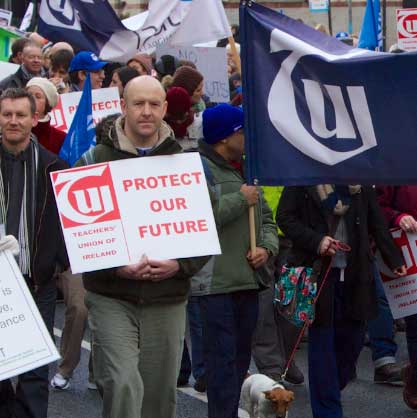 Members of the 3 teacher unions – INTO, TUI and ASTI – have begun a ballot for industrial action which, if agreed, “will be triggered in the event of government proceeding unilaterally to impose salary cuts or to worsen working conditions.” INTO members will vote at meetings to be held across the country this coming week while ASTI and TUI members are voting by postal ballot with a closing date of 20th May.
Members of the 3 teacher unions – INTO, TUI and ASTI – have begun a ballot for industrial action which, if agreed, “will be triggered in the event of government proceeding unilaterally to impose salary cuts or to worsen working conditions.” INTO members will vote at meetings to be held across the country this coming week while ASTI and TUI members are voting by postal ballot with a closing date of 20th May.
CAHWT in a trap? - Review from 2013 Anarchist Bookfair
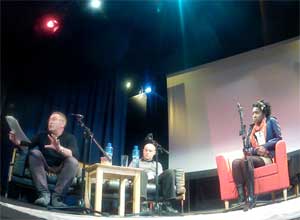 The talk on the Campaign Against Home and Water Taxes (CAHWT) at the Anarchist Bookfair 2013 in the Main Hall was relatively sombre in tone to say the least. The echoing clamour of the Main Hall only served to highlight the strange impasse which the campaign has found itself in of late. The assembled survivors could have fitted easily into Room 2, which was packed to capacity by speakers on issues which would seemingly be less of a political immediacy.
The talk on the Campaign Against Home and Water Taxes (CAHWT) at the Anarchist Bookfair 2013 in the Main Hall was relatively sombre in tone to say the least. The echoing clamour of the Main Hall only served to highlight the strange impasse which the campaign has found itself in of late. The assembled survivors could have fitted easily into Room 2, which was packed to capacity by speakers on issues which would seemingly be less of a political immediacy.
Guest review by Ciara
Come Here to Me blog discussion at the 2013 Dublin anarchist book fair
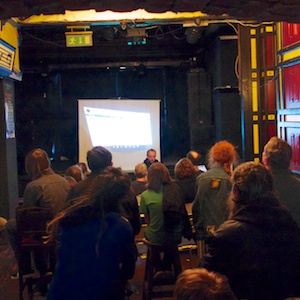 If you are not familiar with the infamous Come Here to Me blog then you should really have a look at it or the book and join thousands of other readers finding out about social history in Dublin. There are over 2,000 stories on the site addressing many different facets of everyday life and culture in Dublin from forgotten lanes, to overlooked monuments through to stories about the Gards, the eating habits of Dubs, and clubbing in the 50's and everything in between. The site has won a number of awards over the years and two of the authors spoke at the Dublin Anarchist Bookfair to a crowd of academics, librarians, archivists and many interested members of the general public.
If you are not familiar with the infamous Come Here to Me blog then you should really have a look at it or the book and join thousands of other readers finding out about social history in Dublin. There are over 2,000 stories on the site addressing many different facets of everyday life and culture in Dublin from forgotten lanes, to overlooked monuments through to stories about the Gards, the eating habits of Dubs, and clubbing in the 50's and everything in between. The site has won a number of awards over the years and two of the authors spoke at the Dublin Anarchist Bookfair to a crowd of academics, librarians, archivists and many interested members of the general public.
Time for a New Economics - Lost in a Maze of Economic Gibberish
 Ever wondered why the lexicon of global finance seems so complicated? Why so much of what passes for economic debate seems impenetrable? Do your eyes glaze over as commentators wander into discursive mazes comprised of derivatives, subprime lenders, credit default swaps, and toxic assets? Does talk of liquidity, quantitative easing, or collaterised debt obligations send you reaching for the remote control or the off-switch? Is it possible we are just too economically illiterate to understand anything about the world of global finance?
Ever wondered why the lexicon of global finance seems so complicated? Why so much of what passes for economic debate seems impenetrable? Do your eyes glaze over as commentators wander into discursive mazes comprised of derivatives, subprime lenders, credit default swaps, and toxic assets? Does talk of liquidity, quantitative easing, or collaterised debt obligations send you reaching for the remote control or the off-switch? Is it possible we are just too economically illiterate to understand anything about the world of global finance?
Hidden from View: Asylum & Deportation in Ireland
 This article was prompted by a number of recent events. Firstly, the Irish Refugee Council (IRC) organised a meeting on April 3rd to organise a campaign aimed at ending the inhumane system known as Direct Provision . And secondly, ADI (Anti-Deportation Ireland) held a workshop at Dublin’s Anarchist Bookfair on April 6th, followed by an ADI public meeting in Dublin on April 11th. Both ADI events aimed to build a campaign against deportations in Ireland.
This article was prompted by a number of recent events. Firstly, the Irish Refugee Council (IRC) organised a meeting on April 3rd to organise a campaign aimed at ending the inhumane system known as Direct Provision . And secondly, ADI (Anti-Deportation Ireland) held a workshop at Dublin’s Anarchist Bookfair on April 6th, followed by an ADI public meeting in Dublin on April 11th. Both ADI events aimed to build a campaign against deportations in Ireland.
Teachers unions showing the way - ‘No’ vote only the start – build now for industrial action
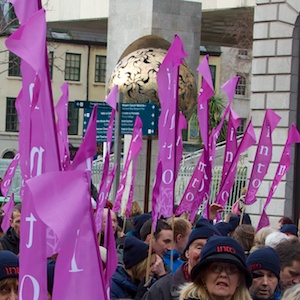 The decision of the 3 teacher unions to conduct a ballot for industrial action ups the ante in the battle against government attempts to impose a new round of paycuts on public sector workers. The unions have announced a decision to “conduct a ballot of members for industrial action, up to and including strike action”, and that industrial action “will be triggered in the event of government proceeding unilaterally to impose salary cuts or to worsen working conditions.”
The decision of the 3 teacher unions to conduct a ballot for industrial action ups the ante in the battle against government attempts to impose a new round of paycuts on public sector workers. The unions have announced a decision to “conduct a ballot of members for industrial action, up to and including strike action”, and that industrial action “will be triggered in the event of government proceeding unilaterally to impose salary cuts or to worsen working conditions.”
“The law is your shield, direct action is your sword” – Organising the Unorganised- audio & review
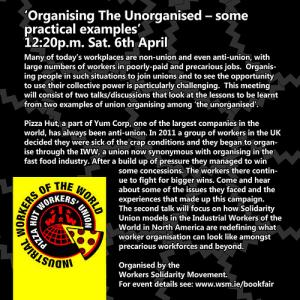 The topic of this talk (audio link below) was on organising unions in non-unionised workplaces, and possibly re-invigorating places where unions are ostensibly still organised. Our labour market locally is increasingly casualised, de-skilled, and less well paid. “Flexible” arrangements between employer and employee are the current code word for the slashing of security of contract and the threat of relocation of capital. Unions have historically been the only means of lower paid workers countering trends like these, so the question as to how workers organise and fight back is coming back into focus more and more. This talk intended to address just that, and the speakers put forward arguments for an alternative to the top-down trade unionism that evidently isn’t working today.
The topic of this talk (audio link below) was on organising unions in non-unionised workplaces, and possibly re-invigorating places where unions are ostensibly still organised. Our labour market locally is increasingly casualised, de-skilled, and less well paid. “Flexible” arrangements between employer and employee are the current code word for the slashing of security of contract and the threat of relocation of capital. Unions have historically been the only means of lower paid workers countering trends like these, so the question as to how workers organise and fight back is coming back into focus more and more. This talk intended to address just that, and the speakers put forward arguments for an alternative to the top-down trade unionism that evidently isn’t working today.
The state of the unions - the legacy of 1913 and the trade union movement today
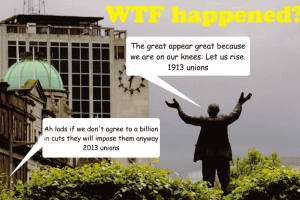 Having spent the early part of this week at the annual conference of my union – the Irish National Teachers Organisation – I’m struck by the view that unions today appear to be a different world entirely from that of 100 years ago. My talk will focus less on 1913 and more on where the trade union movement finds itself today
Having spent the early part of this week at the annual conference of my union – the Irish National Teachers Organisation – I’m struck by the view that unions today appear to be a different world entirely from that of 100 years ago. My talk will focus less on 1913 and more on where the trade union movement finds itself today

